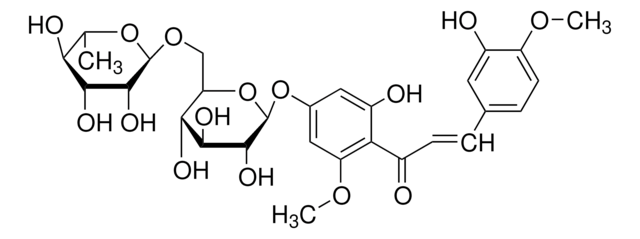83400
D-(+)-Raffinose pentahydrate
suitable for microbiology, ≥99.0%, Microbiological media component
Synonym(s):
O-α-D-Galactopyranosyl-(1-6)-α-D-glucopyranosyl β-D-fructofuranoside pentahydrate, Melitose, Melitriose, O-α-D-Galactopyranosyl-(1→6)-α-D-glucopyranosyl β-D-fructofuranoside, Melitose, Melitriose
About This Item
Recommended Products
Quality Level
Assay
≥99.0% (HPLC)
≥99.0%
form
powder
optical activity
[α]20/D +105±2°, c = 10% in H2O
ign. residue
≤0.1% (as SO4)
mp
78-80 °C
solubility
H2O: 0.1 g/mL, clear, colorless
anion traces
chloride (Cl-): ≤50 mg/kg
sulfate (SO42-): ≤50 mg/kg
cation traces
As: ≤0.1 mg/kg
Ca: ≤20 mg/kg
Cd: ≤5 mg/kg
Co: ≤5 mg/kg
Cr: ≤5 mg/kg
Cu: ≤5 mg/kg
Fe: ≤5 mg/kg
K: ≤50 mg/kg
Mg: ≤5 mg/kg
Mn: ≤5 mg/kg
Na: ≤50 mg/kg
Ni: ≤5 mg/kg
Pb: ≤5 mg/kg
Zn: ≤5 mg/kg
application(s)
microbiology
storage temp.
10-30°C
SMILES string
O.O.O.O.O.OC[C@H]1O[C@H](OC[C@H]2O[C@H](O[C@]3(CO)O[C@H](CO)[C@@H](O)[C@@H]3O)[C@H](O)[C@@H](O)[C@@H]2O)[C@H](O)[C@@H](O)[C@H]1O
InChI
1S/C18H32O16.5H2O/c19-1-5-8(22)11(25)13(27)16(31-5)30-3-7-9(23)12(26)14(28)17(32-7)34-18(4-21)15(29)10(24)6(2-20)33-18;;;;;/h5-17,19-29H,1-4H2;5*1H2/t5-,6-,7-,8+,9-,10-,11+,12+,13-,14-,15+,16+,17-,18+;;;;;/m1...../s1
InChI key
BITMAWRCWSHCRW-PFQJHCPISA-N
Looking for similar products? Visit Product Comparison Guide
General description
Application
D-(+)-Raffinose pentahydrate can be used as a carbon source for the cultivation of yeast
It is used by beneficial probiotic bacteria like Bifidobacteria and Lactobacilli but could be used as well for differentiation and identification of Escherichia coli, Enterococcus faecium and Streptococcus pneumoniae.
It can also be used in certain cryoprotectant solutions.
Storage Class Code
11 - Combustible Solids
WGK
WGK 3
Flash Point(F)
Not applicable
Flash Point(C)
Not applicable
Personal Protective Equipment
Choose from one of the most recent versions:
Already Own This Product?
Find documentation for the products that you have recently purchased in the Document Library.
Customers Also Viewed
Our team of scientists has experience in all areas of research including Life Science, Material Science, Chemical Synthesis, Chromatography, Analytical and many others.
Contact Technical Service








